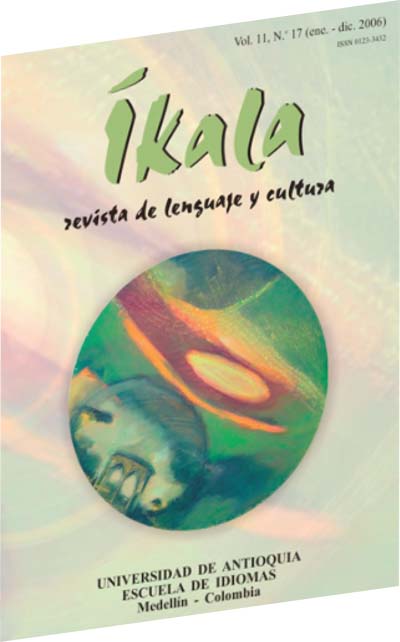*Análisis contrastivo e interlingüístico de peticiones en inglés y español
DOI:
https://doi.org/10.17533/udea.ikala.2782Keywords:
interlanguage pragmatics, speech acts, realization of requests in English, pragmatic transfer, pragmatic competenceAbstract
This article presents the main results of a descriptive investigation in the field of interlanguage pragmatics. It contrasts the requests formed by native speakers of Spanish, by native speakers of English, and by learners of English as a foreign language. Data was collected through a closed role-play, in order to analyze the semantic strategies and the internal and external modifications used by participants in the oral production of requests. This analysis allowed the detection of pragmatic transfer from Spanish to English. This outcome is crucial for the design of methodological and curricular proposals that contribute to offset the effect of this factor as a generator of communicative breakdowns and misunderstandings when learning a second or foreign language.
Reçu: 09-03-06 / Accepté: 18-07-06
How to reference this article:
Tello Rueda, L. Y. (2006). Análisis contrastivo e interlingüístico de peticiones en inglés y español. Íkala. 11 (1), pp. 89 – 116
Downloads
References
Achiba, M., 2002, Learning to Request in a Second Language: A Study of Child Interlanguage Pragmatics, Clevedon, Multilingual Matters, Second Language Acquisition series.
Alcón, E., 2005, “Does instruction work for learning pragmatics in the EFL context?”, System, núm. 33, pp. 417-435.
Bardovi-Harlig, K., 1996, “Pragmatics and language teaching: Bringing pragmatics and pedagogy together”, en: L. Bouton, ed., Pragmatics and Language Learning. Monograph series 7, Urbana Champaign, Division of English as an Internacional Language, University of Illinois, pp. 21-39.
__, 2001, “Evaluating the empirical evidence: Grounds for instruction in pragmatics?”, en: G. Kasper y K. Rose, eds., Pragmatics and Language Teaching, Cambridge, Cambridge University Press, pp. 11-32.
Blum-Kulka, S., 1989, “Playing it safe”, en: S. Blum-Kulka, J. House y G. Kasper, eds., CrossCultural Pragmatics: Requests and Apologies, New Jersey, Ablex Publishing Corporation, pp. 37-70.
Blum-Kulka, S., B. Danet y R. Gherson, 1985, “The language of requesting in Israeli society”, en: J. Forgas, ed., Language and Social Situation, New York, Springer Verlag, pp. 113-141.
Blum-Kulka, S., y J. House, 1989, “Cross-cultural and situational variation in requesting behavior”, en: S. Blum-Kulka, J. House y G. Kasper, eds., Cross-Cultural Pragmatics: Requests and Apologies, New Jersey, Ablex Publishing Corporation, pp. 123-154.
Blum-Kulka, S., J. House y G. Kasper, 1989, “Investigating Cross-Cultural Pragmatics: An introductory overview”, en: S. Blum-Kulka, J. House y G. Kasper, eds., Cross-Cultural Pragmatics: Requests and Apologies, New Jersey, Ablex Publishing Corporation, pp. 1-34.
Brown, P., y S. Levinson, 1978, “Universals of language usage: Politeness phenomena”, en: E. Goody, ed., Questions and Politeness, Cambridge, England, Cambridge University Press, pp. 56-324. Chomsky, N., 1980, Rules and Representations, New York, Columbia University Press. 113 Íkala, revista de lenguaje y cultura Vol. 11, N.º 17 (ene.-dic., 2006)
Clark, H., 1979, “Responding to indirect speech acts”, Cognitive Psychology, núm. 11, pp. 430-477.
Cohen, A. D., y E. Olshtain, 1994, “Researching the production of speech acts”, en: E. Tarone, S. M. Gass y A. D. Cohen, eds., Research Methodology in Second Language Acquisition, Hillsdale, NJ, Lawrence Erlbaum, pp. 143-156.
Cohen, A. D.; R. M. Paige, R. L. Shively, H. Emert y J. Hoff, 2005, Maximizing study Abroad through Language and Culture Strategies: Research on Students, Study Abroad Program Professionals, and Language Instructors, Final Report to the International Research and Studies Program, [HTML document]. Office of International Education, DOE. Minneapolis, MN: Center for Advanced Research on Language Acquisition, University of Minnesota. [Consulta: 28 de julio de 2006].
Faerch, C., y G. Kasper, 1989, “Internal modification in interlanguage request realization”, en: S. Blum-Kulka, J. House y G. Kasper, eds., Cross-Cultural Pragmatics: Requests and Apologies, New Jersey, Ablex Publishing Corporation, pp. 221-247.
Golato, A., 2003, “Studying compliment responses: a comparison of DCTs and naturally occurring talk”, Applied Linguistics, núm. 24, pp. 90-121.
Houck, N., y S. Gass, 1996, “Non-native refusals: A methodological perspective”, en: S. Gass y J. Neu, eds., Speech Acts across Cultures, New York, Mouton de Gruyter, pp. 45-64. House,
J. y G. Kasper, 1987, “Interlanguage Pragmatics: Requesting in a foreign language”, en: W. Lorscher y R. Schulze, eds., Perspectives on Language and Performance: Festschrift for Werner Hullen, Tubingen, Germany, Narr.
Hudson, J., 2001, “Indicators for pragmatic instruction: some quantitative tools”, en: G. Kasper y K. Rose, eds., Pragmatics and Language Teaching, Cambridge, Cambridge University Press, pp. 283-300.
Kasper, G., 1992, “Pragmatic transfer”, Second Language Research, núm. 8, pp. 203-231.
__, 1997, Can Pragmatic Competence be taught? (NetWork #6) [HTML document]. Honolulu, University of Hawaii, Second Language Teaching & Curriculum Center, [Consulta: 26 de febrero de 2006].
Kasper, G., y R. Schmidt, 1996, “Developmental issues in interlanguage pragmatics”, Studies in Second Language Acquisition, núm. 18, pp. 149-169.
Kasper, G., y K. Rose, 2002, Pragmatic Development in a Second Language, Malden, MA, Blackwell Publishing, Inc.
Koike, D., 1989, “Pragmatic competence and adult L2 acquisition: speech acts in interlanguage”, The Modern Language Journal, núm. 73, pp. 279-289.
Leech, G., 1983, Principles of Pragmatics, London and New York, Longman.
Le Pair, R., 1996, “Spanish request strategies: a cross-cultural analysis from an intercultural perspective”, Language Sciences, vol. 18, núms. 3-4, pp. 651-670.
Downloads
Published
How to Cite
Issue
Section
License
Copyright (c) 2006 Íkala, Revista de Lenguaje y Cultura

This work is licensed under a Creative Commons Attribution-NonCommercial-ShareAlike 4.0 International License.












